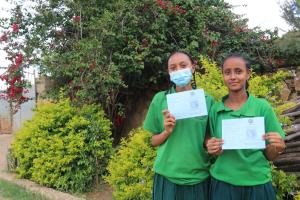Human papillomavirus vaccination in Ethiopia protects over 6.3 million girls from cervical cancer
Addis Ababa ‒ Fourteen-year-old girl Saba. D. (name changed), from Ethiopia’s capital, Addis Ababa, has just received her first and final dose of the human papillomavirus (HPV) vaccine, which protects against cervical cancer. This cancer is the second most common cancer among women in Ethiopia after breast cancer and each year significant number of women die from it.
Prior to getting the vaccine, Saba attended an orientation session on HPV at her school, along with her friends. “The orientation was given by our teachers, the health workers and community mobilizers. I have also discussed with my parents on the same matter since they have been also sensitized about the benefit of HPV vaccine, and thus they advised me to get the vaccine from my school,” she says.
Saba is one of the 1.5 million 14-year-old girls who were vaccinated in early March 2024, as part of a four-day nationwide vaccination campaign. The HPV vaccine is being administered using a campaign mode by availing vaccination for four consecutive days at fixed vaccination posts and temporary fixed vaccination posts at schools where most of the target age group, 14-year-age girls, are easily found.
The Ethiopian Ministry of Health (MoH) Ethiopia recommends that the HPV vaccine is administered to girls between the ages of 9 and 14 years before they become sexually active, and exposed to the virus that causes changes to the cervix that can lead to cancer. However, due to the global HPV vaccine shortage, Ethiopia introduced the vaccine in December 2018 for 14-year-old girls only. To date, over 6.3 million girls in Ethiopia have received one dose of the vaccine.
Based on the MoH decision and the country’s National Immunization Technical Advisory Groups, the two-dose schedule used over the past five years was switched to a single-dose schedule for the primary target group, girls aged 14 years. The decision was based on the evidence which indicated that a single-dose schedule provides solid protection with a comparable efficacy to the two or three-dose schedules. This evidence has also been evaluated and recommended by the WHO Strategic Advisory Group of Experts on Immunization (SAGE) in 2022.
“Ethiopia is demonstrating great progress in HPV vaccination, achieving high rates of vaccine coverage among 14-year-old girls. The country is preparing to build on this success and expand coverage to provide multi-age-cohort vaccination among 9 to 14 year old girls”, says Dr. Owen Kaluwa, WHO Representative in Ethiopia.
Sensitization and community mobilization have been conducted with support from different partners. National and regional advocacy workshops were conducted to sensitize and engage different stakeholders, including religious leaders, Ministry of Women and Social Affairs representatives, schoolteachers, medical associations, people with disabilities, media and hotline workers. Key messages were developed for town announcements, TV and radio spots and broadcasted through various media outlets.
“Providing awareness to the community and parents is key for the success of this campaign. I urge parents to use this opportunity to get their girls vaccinated against Human Papilloma Virus (HPV) and protect their children from the deadly cervical cancer,” says Dr Kaluwa.
Dr Yohannes Chala, the Health Bureau Head of Addis Ababa City Administration, acknowledges that the great collaboration with the education sector was key to the success of the campaign. During a post-campaign evaluation meeting, he also thanked and acknowledged partners, including WHO, for the great role and contribution towards achieving the target.
Partners like WHO, UNICEF, CHAI, JSI/immunization, PATH, IRC, CCRDA/CGPP, JSI/QHA, FHI360, and Girls Effect provided technical support by deploying technical assistants to sub-national levels. They have also provided vehicles support for supportive supervision and supply distribution.
Saba is happy that she has been able to receive the vaccine. “I have learned that the HPV vaccine is safe and effective in preventing HPV infection that causes most of cervical cancer,” she says.
